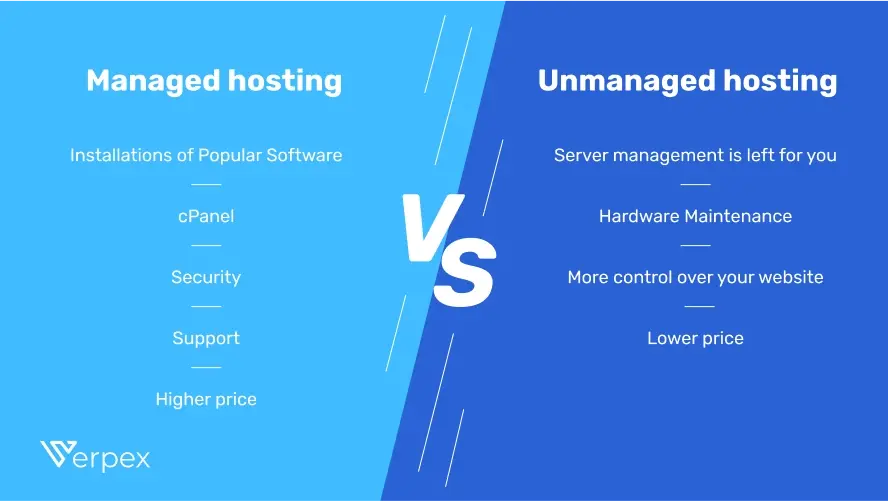Cost-benefit Analysis of Self-managing Online Resources
- 1 Case study: The best web hosting for your needs
- 2 What Is a Cost-Benefit Analysis?
- 3 Why Conduct a Cost-Benefit Analysis for Online Resources?
- 4 Managed vs. Unmanaged Hosting: A Case Study
- 4.1 Managed Hosting: A Hassle-Free Option
- 4.2 Key Benefits of Managed Hosting:
- 4.3 Costs of Managed Hosting:
- 4.4 Unmanaged Hosting: A More Affordable, DIY Approach
- 4.5 Critical Benefits of Unmanaged Hosting:
- 4.6 Costs of Unmanaged Hosting:
- 5 Cost-Benefit Analysis: Managed vs. Unmanaged Hosting
- 6 Conclusion: Which Option Is Best for You?
- The cost-benefit analysis involves adding up the costs of a decision and subtracting them from the expected benefits.
- Managed hosting is more expensive due to the technical support and services included.
- Clients who choose unmanaged need resources to handle server management
- The cost of hiring a technical expert can be higher than what you’d pay for managed hosting
- Managed hosting is about twice as expensive as unmanaged
Conducting a cost-benefit analysis is vital for businesses considering whether to manage their online resources independently. This analysis involves evaluating a decision’s potential costs and benefits, helping companies assess financial feasibility. For online resources like web hosting, it means weighing the costs of managing servers versus outsourcing to a managed service provider.
Case study: The best web hosting for your needs
For this article, we’ll compare two types of web hosting: managed and unmanaged. With managed hosting, the provider manages the website’s technical side. This includes security patches, server setup and configuration, updates, maintenance, monitoring, backups, and troubleshooting.
In this type of hosting, the client typically leases server space from the hosting company, ensuring the servers run securely and smoothly. When choosing between managed vs unmanaged hosting, you must decide whether you can take responsibility for server security, configuration, and maintenance. This task will be in addition to your other business activities.
Managed hosting is more expensive due to the management support and services included. It comes with flexible bandwidth, essential if your site experiences occasional traffic spikes or the traffic level is generally unpredictable. On the other hand, unmanaged hosting has fixed limits. Managed hosting tends to be more secure, as the web host handles updates, security patches, and monitoring.
What Is a Cost-Benefit Analysis?
A cost-benefit analysis (CBA) is a process that helps decision-makers weigh the financial pros and cons of an action by comparing the costs involved against the expected benefits. The basic formula is to subtract expenses from the expected benefits. If the result is positive, the decision is likely a good investment. If negative, you may need to rethink your approach.
The critical decision in web hosting is whether to manage servers on your own (unmanaged hosting) or outsource this task to professionals (managed hosting). This decision has far-reaching implications, especially regarding the required costs, time, and technical expertise.
Why Conduct a Cost-Benefit Analysis for Online Resources?
The primary goal of a CBA is to help businesses understand whether a particular project or strategy is worth pursuing. When it comes to managing online resources like hosting, there are several factors to consider:
- Long-term savings vs. short-term costs: Do the initial investments pay off in the long run?
- Time management: How much time will managing servers consume, and will it detract from core business operations?
- Scalability: Will your decision accommodate future growth?
- Technical expertise: Do you or your team have the skills to manage these resources without professional help?
By conducting a thorough CBA, you can make a data-driven decision that will impact your business’s financial and operational health.
Managed vs. Unmanaged Hosting: A Case Study

To better understand the cost-benefit analysis in managing online resources, let’s explore two popular hosting options: managed and unmanaged.
Managed Hosting: A Hassle-Free Option
Managed hosting is a solution where the service provider handles all the technical aspects of running your website. This includes:
- Server setup and configuration
- Security updates and patches
- Routine maintenance and monitoring
- Data backups
- Troubleshooting and support
Managed hosting takes the load off your shoulders by providing a full-service package that ensures your website operates smoothly. This is ideal for businesses that lack in-house technical expertise or don’t want to deal with the intricacies of server management.
Key Benefits of Managed Hosting:
- Technical Support: Managed hosting provides 24/7 support, ensuring experts quickly resolve server issues.
- Security: Providers handle all security patches, protecting your website from cyber threats.
- Convenience: Since the hosting provider handles server management, you can focus on your core business activities.
- Scalability: Managed hosting packages are often designed to handle traffic spikes, making them more reliable for growing businesses.
Costs of Managed Hosting:
Managed hosting is significantly more expensive than unmanaged hosting due to the additional services provided. Typically, the cost of managed hosting can be twice that of unmanaged hosting, but prices vary depending on the service provider and the features included.
Unmanaged Hosting: A More Affordable, DIY Approach
The service provider provides basic server hardware and network connectivity in unmanaged hosting. From there, you are responsible for:
- Server setup and configuration
- Installing and maintaining security patches
- Managing backups
- Monitoring server performance
- Troubleshooting technical issues
For businesses with in-house technical expertise, unmanaged hosting offers more control and customization options. However, it requires a significant time investment and technical know-how.
Critical Benefits of Unmanaged Hosting:
- Cost-Effective: Unmanaged hosting is cheaper because you aren’t paying for additional services like security, maintenance, or support.
- Customization: You have complete control over the server, allowing you to tweak settings based on your needs.
- Flexibility: Unmanaged hosting provides more flexibility for businesses with technical expertise, allowing them to manage resources according to their requirements.
Costs of Unmanaged Hosting:
While unmanaged hosting is cheaper, hiring technical experts or using your team’s time to manage servers can add up quickly. If you don’t have the skills in-house, you’ll likely need to hire system administrators or IT professionals, which can be more expensive than managed hosting.
Cost-Benefit Analysis: Managed vs. Unmanaged Hosting
To help visualize the cost-benefit analysis of managed and unmanaged hosting, let’s look at a typical scenario:
| Factor | Managed Hosting | Unmanaged Hosting |
|---|---|---|
| Initial Costs | High (due to added services) | Low (only basic hardware and network) |
| Maintenance | Covered by the hosting provider | Client is responsible |
| Security | Handled by the hosting provider | The client must install patches |
| Technical Expertise | Not required | Required or need to hire IT staff |
| Scalability | Easily scalable | It depends on the client’s ability |
| Overall Control | Less control | Full control |
| Monthly Cost | Approximately twice as high as unmanaged | Lower monthly cost |
When comparing managed and unmanaged hosting, several factors must be considered:
- Technical Expertise: If you don’t have the skills to manage a server, you’ll need to hire professionals. This could substantially increase costs, making managed hosting more financially viable.
- Time Investment: Managing a server can be time-consuming. If you’d instead focus on business operations, managed hosting may save you valuable time.
- Security Concerns: With increasing cyber threats, managed hosting offers more peace of mind since the provider handles all security-related tasks.
- Scalability: If you anticipate rapid growth, managed hosting might be more suitable because it offers flexible bandwidth and can easily handle traffic spikes.
- Control and Customization: If your business needs specific server configurations or customizations, unmanaged hosting might be the better option, as it allows complete control over the server environment.
Conclusion: Which Option Is Best for You?
In conclusion, both managed and unmanaged hosting have their pros and cons. Your decision should be based on a careful cost-benefit analysis considering your business’s needs, resources, and technical capabilities.
- Managed Hosting is ideal if you want a hands-off approach and have the budget to pay for added convenience and security.
- Unmanaged Hosting is perfect for businesses with technical expertise that want complete control over their servers and prefer a more cost-effective solution.
Ultimately, the choice between managed and unmanaged hosting depends on how much you value your time and resources. Managed hosting might cost more upfront, but it can save you in the long run by eliminating the need for technical expertise and freeing up your time to focus on growing your business. Unmanaged hosting offers greater flexibility and control, but the hidden costs of managing everything yourself might outweigh the savings for many companies.
By understanding the costs and benefits, you can make an informed decision supporting your business goals.

















